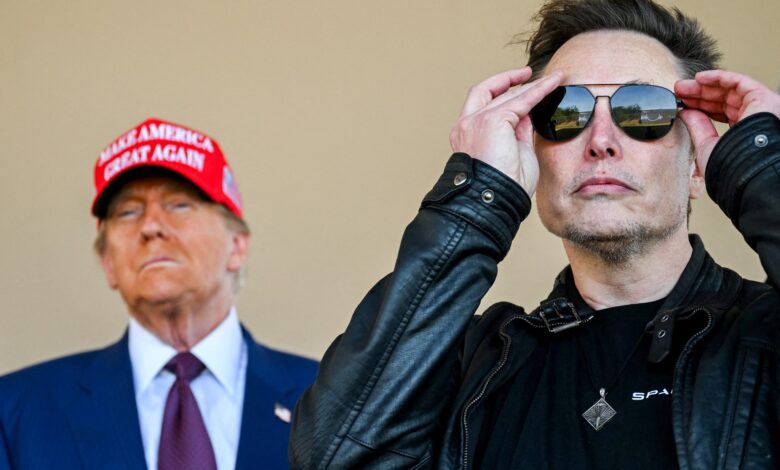Department of Government Efficiency a smart move to optimise US bureaucracy, says expert

HomeWorld NewsDepartment of Government Efficiency a smart move to optimise US bureaucracy, says expert
Speaking to CNBC-TV18, former Commissioner of the Federal Energy Regulatory Commission, Neil Chatterjee expressed cautious optimism about the Department of Government Efficiency (DoGE) initiative, which aims to reduce government spending and streamline the federal bureaucracy.
One of the most intriguing developments in Trump’s second administration is the creation of the Department of Government Efficiency (DoGE), a project spearheaded by Elon Musk and Vivek Ramaswamy.
Speaking to CNBC-TV18, former Commissioner of the Federal Energy Regulatory Commission, Neil Chatterjee expressed cautious optimism about the DoGE initiative, which aims to reduce government spending and streamline the federal bureaucracy.
“Most civil servants in the US are patriots who work to help our country. But there can be greater efficiencies, and I think having two tremendously successful business people take a closer look at how to make American government more efficient is an excellent idea,” Chatterjee said.
Chatterjee also discussed the future of US energy policy, particularly in the context of Trump’s return to office. With a growing emphasis on national security and the race to dominate artificial intelligence (AI), Chatterjee stressed that energy will play a pivotal role in the success of the country. “In order to win that AI race, it is going to require a tremendous amount of energy to power AI,” he noted, arguing that the US will need to harness energy from all available sources to fuel technological advancement.
As for the future of clean energy in the US, Chatterjee is not convinced that repealing the Inflation Reduction Act, a key piece of legislation that offers subsidies to green energy initiatives, would serve the country’s best interests. He suggested that Trump’s administration will quickly recognise the importance of energy policies that stimulate growth across multiple sectors. “Repealing components of the Inflation Reduction Act that are stimulating energy growth in the country is not in the US’s interest. And I think lawmakers will quickly recognise that,” he remarked.
Below are the excerpts of the interview.
Q: A lot of caution around the world with Donald Trump’s economic plan. Do you think it would be prudent to repeal the Inflation Reduction Act, which has given subsidies to US businesses? And many of them are looking for continued support from the US government to transition to a clean economy and also bring manufacturing closer home?
Chatterjee: I actually think that the conventional wisdom about how energy policy will be handled in the second Trump administration is wrong. I actually think that once the leaders of the new administration are seated, they are going to very quickly recognise the challenges that energy will present. Because we need in the United States of America to win the artificial intelligence (AI) race for national security purposes. And in order to win that AI race it is going to require a tremendous amount of energy to power AI. And I think that energy is going to have to come from all sources. And so repealing components of the Inflation Reduction Act that are stimulating energy growth in the country is not in US’s interest. And I think lawmakers will quickly recognise that.
Q: Your outlook on the US energy sector. Do you expect volatility as President Trump takes over and things would settle down in the months to come? What about the US transition to clean energy? The electric vehicle transition that we are looking at?
Chatterjee: I think market forces will drive a lot of that. I think what President Trump will provide is certainty and stability. I think one of the challenges and frustrations that we saw for the past four years with the Biden administration is they often sent conflicting signals. On the one hand, they said we are going to support our European allies with liquefied natural gas exports, and then they simultaneously put a pause on approving new facilities in the US. Those kinds of mixed messages confounded investors and I think led to a lot of instability.
I think President Trump coming in, focusing on American energy dominance will have a positive effect in that, it will encourage investment in all forms of energy, because there will be certainty. And then I come back to this idea that the growth and demand for electricity that will be driven by AI will be unprecedented in the US and I think will have a significant impact on energy policy.
Q: I would also like to ask you about the efficiency commission, the Bureau of Efficiency, which is being set up by Donald Trump. Elon Musk is going to be heading that. How do you think this is going to function? What’s going to be Elon Musk’s relationship with the government? And essentially, what do you think Trump 2.0 is actually going to stand for?
Chatterjee: So what they’re looking to do with the Department of Government Efficiency is Elon Musk and Vivek Ramaswamy are, are looking at ways to cut spending and to shrink the federal bureaucracy. And the hope is that that will unburden the American economy and help it to thrive. And I’m optimistic to see how they will approach this and what they’ll be able to do.
Most civil servants in the US are patriots who work to help our country. But there can be greater efficiencies, and I think having two tremendously successful business people take a closer look at how to make American government more efficient is an excellent idea.
Watch accompanying video for entire conversation.



